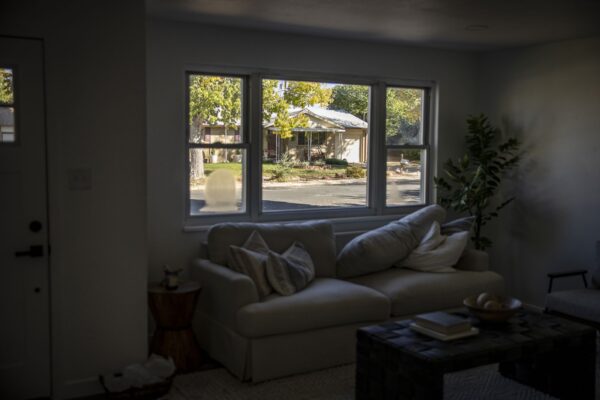By Prashant Gopal
After an abrupt end to the US housing boom, home flippers who were winning big just months ago are now racing to stem losses.
The doubling of mortgage rates since January has crushed buyer demand and depressed values in investors’ most favored locations, from Phoenix and Las Vegas to Jacksonville, Florida. It’s a swift turnabout for flippers such as Tammi Merrell, who’s stuck with homes to sell and loans to pay.

“It’s a high-risk, high-reward business — and now we’re facing the high risk,” said Merrell, a full-time flipper in the Denver area. “I’m just praying for break even.”
America’s housing slowdown is upending the real estate industry and chilling sales as both buyers and sellers pull back. But it’s a particularly big blow to flippers, from property rookies to giant iBuyers like Opendoor Technologies Inc., who are taking losses on quick deals in hopes of heading off problems before they get worse.
Flippers with loans need to repay them, and rising interest rates make carrying costs even greater. Their troubles can reverberate across the market: Just as investors bid prices higher on the way up, they can accelerate the move downward.
For most flippers, the focus will be on selling, and the faster, the better. A small number will keep buying even though finding “truly undervalued homes is a guessing game of how far the market will drop,” said Steven Swidler, an economics professor at Lafayette College in Pennsylvania who studied flippers in the aftermath of the 2008 financial crisis.
“It’s a human foible: We hate to take losses and we don’t necessarily adjust expectations to what they should be,” Swidler said. “It’s like the Kenny Rogers song, The Gambler. Some don’t know when to fold.”
Home-flipping activity reached a record at the start of the year, making up one in 10 transactions, surpassing the levels in the last bubble, according to Attom, an Irvine, California-based data provider, which tracked sales of properties that previously sold within the last 12 months. While the share remains elevated, it fell to 8.2% in the second quarter.
Conditions have deteriorated more since then, with mortgage rates near the highest level in 15 years. Demand has cooled particularly fast in Sun Belt markets such as Phoenix, Jacksonville and Atlanta, pandemic boom areas where affordability has been strained. Flippers made up about 14% of transactions in those regions in the second quarter but those shares sank in July and August, according to more recent monthly data provided by Attom.
The typical profit margin in August dropped to 25.9% from 30.9% a year earlier. In Austin, Texas, flippers lost almost 1%, and in San Jose, California, where prices are falling fastest, the margin was just 6.5% after topping 45% in March.
“Flippers are powering the wild swings in prices,” Mark Zandi, chief economist for Moody’s Analytics, said of the most speculative markets. They’re “pushing them skyward when mortgage rates were low, and forcing prices back to earth now that rates are higher.”
That’s not entirely bad. Flippers can help markets reach their floor quickly by cutting prices more aggressively than traditional homeowners who can typically afford to wait for more favorable conditions. In doing so, they can get the housing market moving again by allowing prices to fall faster, so they’re affordable to buyers. The risk is that values could drop too much, sinking beneath what would might have otherwise been their natural bottom. Read about how weird things are getting in the housing market
Phoenix property investor Ben Arredondo has had to slash prices after the slowdown caught him mid-flip on 27 houses. He’s managed to sell most of them but says he expects to lose around $1.3 million — if he’s lucky.
“I know a lot of investors who are getting hammered,” Arredondo said.
So-called iBuyers such as Opendoor are also taking their lumps like traditional flippers, just on a bigger scale. These companies seek to make a profit in part by charging each seller a service fee to take a home off their hands and then resell it after making minor repairs.
Opendoor’s performance in recent weeks shows what investors like Merrell are up against. Across the US, 42% of the homes the company sold in August transacted for less than what it paid for them, according to YipitData. That figure was 76% in Phoenix, though that doesn’t include revenue from service fees or other related products. Opendoor lost money on about 20% of all August sales after including service fees, but excluding selling expenses, YipitData said. Opendoor declined to comment on the data.
‘Constant Dance’
Betting on rising US home prices was a winning move for at least a decade, with the pandemic boom only super-charging gains. The potential for profits lured in people such as Merrell, a former employment recruiter who now flips in partnership with her brother. The year started out with a bang for them: They made more than $100,000 on one four-bedroom house alone.
But by May, Merrell knew trouble was brewing when she had to cut a home price by $20,000 to get the property sold. In August, she lost $8,000 on another house as the market deteriorated.
Now she’s got one house under contract, another on the market getting lowball offers and two more in progress that will be finished in the next two months. Losses will grow but even thin margins are a big problem when you’re a full-time flipper, she said, adding that her brother is the sole breadwinner in his family.
“We have hard-money loans with 10% to 14% interest rates,” Merrell said. “It’s a constant dance — do I wait it out or do I price drop? Both cost money.”
For the most part, investors so far are paying back their loans, said Noah Brocious, president of Capital Fund I, a hard-money lender that does business in Phoenix, Colorado and Texas. The default rate in his portfolio, which dipped to 1.25%, has climbed to 2.5% in the past two months. But it remains below pre-pandemic norms.
Flippers with nicely renovated turn-key properties will stand out in this market, Brocious said. But it will be painful for those who overpaid, counting on rapid appreciation to make them money, he said.
“Lots of them in hindsight were making bad buys,” Brocious said. “Anybody that’s flipping right now needs to be looking closely at pricing of property: Price it to sell. Today is not the time to get greedy.”
Arredondo, the Phoenix flipper, is trying to put things in perspective. He won much more over the last two years than he’s likely to lose.
“I’m giving back money I made,” he said.
More stories like this are available on bloomberg.com




